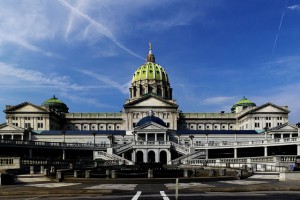Pennsylvania’s Independent Fiscal Office has forecast a significant budget deficit for the state’s 2019-20 fiscal year, citing fixed expenses and the end of one-time revenue sources.
The administration of Democratic Gov. Tom Wolf tried to gently contradict that conclusion, arguing that revenue looks like it’s going to exceed the IFO’s projections. Now, another prominent state official is contradicting the IFO more forcefully, this time on the spending side.
House Appropriations Chairman Stan Saylor, R-Red Lion, issued a news release last week arguing that the IFO has overstated state spending projections by significant amounts for years, and that next year’s budget will likely be the same story – meaning their prediction of a $1.7 billion budget deficit will never happen.
Saylor predicted that Republicans in the House of Representatives simply would not put together a budget that spends what the IFO predicts, and he even went so far as to suggest that Democrats wouldn’t want to hit that level, either.
“The IFO’s predicted deficit is based on the assumption that we enact a $35.6 billion budget in 2019-20,” Saylor wrote. “There simply are no votes in the House Republican Caucus for a budget that large, and I doubt there are 93 votes for it in the House Democrat Caucus.”
Budget discussions begin in earnest with the governor’s budget address, scheduled for Feb. 5. In it, Wolf will lay out his spending priorities for lawmakers.
Saylor’s committee, and his colleagues in the Senate, will then begin the hard, time-consuming work of interrogating agency heads about their budgets. The Senate and House committees are scheduled to combine for more than 50 public hearings between Feb. 11 and March 7 – and coincidentally, the IFO is set to be the first agency that will go before committee members for scrutiny.
In Wolf’s first three years as governor, the Legislature passed budgets without any agreement from Wolf, and he allowed the budgets to become law without his signature. This year, with the November midterm election looming and both parties eager to begin campaigning without having the budget debate stretch through the summer, Wolf finally signed a budget. Lawmakers hailed it as a fiscally responsible document that didn’t raise any taxes, though some observers noted that overall spending in the state continued to rise.
Saylor, picking up on the administration’s recent comments about keeping spending limited, appeared ready to continue the cooperative tone that led to 2018’s relatively smooth budgeting process.
“House Republicans will continue to hold the line on new taxes,” he wrote. “The people of Pennsylvania want a government that lives within its means and we intend to provide that. The governor’s budget secretary stated during the mid-year briefing that the governor’s focus for the next term will be to reduce and restrain spending to balance budgets. If the governor is serious about this, then House Republicans are ready to join him in that effort.”









